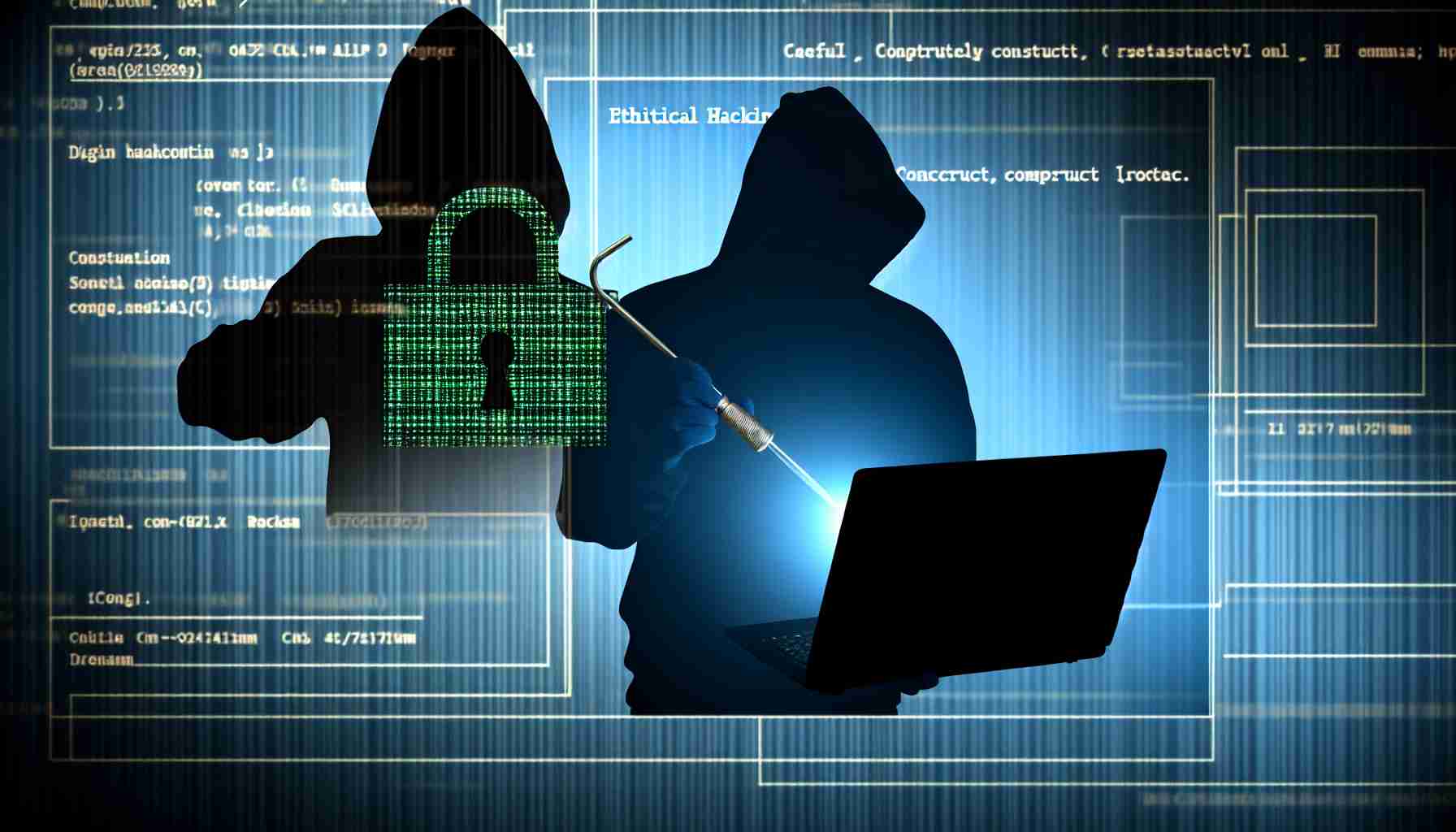Ethical Hacking Basics: Starting Your Cybersecurity Journey
Dive into the fundamentals of ethical hacking and start your journey towards becoming a cybersecurity expert with our comprehensive guide.

Introduction to Ethical Hacking
When we hear the word 'hacker', it often brings to mind shadowy figures with malicious intentions, but ethical hacking turns this notion on its head. This specialized field, also known as penetration testing or white-hat hacking, involves the same skills that malicious hackers use, but for a noble purpose: to secure systems and protect against unauthorized access. Let's demystify the concept: ethical hackers are cyber defenders, armed with authorization to probe and improve security infrastructure. They are the unsung heroes who navigate the digital realm to uncover vulnerabilities before they're exploited. By understanding and employing ethical hacking, organizations and individuals can fortify their cyber defenses, ensuring that their data remains confidential, integral, and available.
The Ethics of Hacking: Understanding the Ground Rules
Ethical hacking is a game of wits and morals, where hackers use their skills for the greater good, abiding by a strict ethical framework. As we navigate the principles that underpin this practice, we realize it's not just about the technical prowess; it's about maintaining integrity while outsmarting cyber threats.
The White Hat Philosophy
Unlike their notorious counterparts, ethical hackers, or 'white hats', are the digital world's unsung heroes, protecting systems by thinking like an attacker. They embody the guardian mindset, establishing defensive strategies that pre-empt malicious hacks. It's a delicate balance of power and responsibility, reflecting the classic mantra: with great capability comes great accountability.
Lawful Boundaries and Consent
Key to ethical hacking is the concept of consent; no system should be probed without the express permission of its owner. This principle distinguishes ethical hackers from cybercriminals. Ethical hackers must navigate the legal landscape, ensuring their work is not only technically sound but also legally compliant. It's crucial to work within a framework that respects privacy and promotes transparency.
Ethical Hacking Certifications: A Trust Badge
Gaining certifications in ethical hacking not only hones your skills but also acts as a testament to your commitment to ethical practices. These certifications, such as the Certified Ethical Hacker (CEH) or Offensive Security Certified Professional (OSCP), serve as markers of trust and expertise, helping to assure clients and employers of an ethical hacker's qualifications and moral compass.
Setting the Stage: Preparing for Ethical Hacking
Embarking on a career in ethical hacking requires more than just technical prowess; it demands a mindset geared towards innovative problem-solving. To set the stage for a successful journey in ethical hacking, careful preparation is essential. This not only involves building a strong technical foundation but also equipping oneself with the right tools and understanding the importance of legality and ethics in every action taken.
Building a Knowledge Foundation
The journey into ethical hacking begins with a solid grounding in networking, systems, and security principles. Essential topics such as TCP/IP protocols, operating system configurations, and the OSI model form the bedrock of knowledge for any aspiring ethical hacker. To further enhance your expertise, consider engaging with online platforms and communities that provide a wealth of information and interactive learning experiences. ( Networking Basics, System Administration, Security Fundamentals)
Assembling Your Ethical Hacking Toolkit
Every ethical hacker needs a toolkit filled with software that can scan, test, and secure various systems. It's crucial to select tools that align with your specific needs and objectives. A well-rounded toolkit typically includes:
- Network scanners to assess and map network vulnerabilities.
- Encryption tools for securing data and communications.
- Penetration testing software to simulate cyber-attacks and identify weaknesses.
Tools like Wireshark for network analysis, TrueCrypt for encryption, and Kali Linux, a suite of ethical hacking tools, are mainstays in the community. ( Wireshark, TrueCrypt, Kali Linux)
Creating a Legal and Ethical Framework
Before delving into systems, ethical hackers must establish a legal and ethical framework to guide their actions. This involves understanding and complying with relevant laws, such as the Computer Fraud and Abuse Act, as well as industry-specific regulations. Additionally, ethical hackers should adhere to a code of conduct that promotes integrity, respect for privacy, and the responsible disclosure of vulnerabilities. Familiarizing yourself with the guidelines provided by organizations like the Electronic Frontier Foundation (EFF) and the International Council of E-Commerce Consultants (EC-Council) can help ensure your hacking practices are both legal and ethical. ( EFF's Code of Ethics, EC-Council)
The Five Phases of Ethical Hacking
Ethical hacking can be dissected into five fundamental phases, each critical in identifying and strengthening vulnerabilities within a system. Mastering these phases is crucial for any cybersecurity professional aiming to safeguard networks and information from malicious intent. Here's an exploration into each critical step of the ethical hacking process.
Reconnaissance: The Art of Information Gathering
The first phase involves meticulous information gathering, laying the groundwork for a targeted hacking strategy. Ethical hackers start by collecting data that will help them understand the target environment. From network maps to system architecture, every piece of information is crucial. Resources like WHOIS databases and network enumeration tools are often leveraged at this stage.
Scanning: Finding the Chinks in the Armor
During the scanning phase, hackers employ various tools to map out system vulnerabilities ready to be tested. They use a combination of static and dynamic analysis methods to inspect network services, looking for open ports or outdated software that could serve as entry points. Tools such as Nmap and vulnerability scanners are indispensable for this phase.
Gaining Access: The Breakthrough
This pivotal phase is where hackers exploit found vulnerabilities to gain unauthorized access to the system. They might use SQL injections, buffer overflows, or cross-site scripting to breach the network. Techniques and tools like Metasploit illustrate the practical application of exploits in a controlled environment, enhancing the system's security posture.
Maintaining Access: The Silent Observer
Once inside, maintaining access allows ethical hackers to understand how malicious attackers could exploit the system over time. They deploy backdoors or Trojans to see if the system's defenses detect and neutralize such threats. Ethical hackers must ensure that their activities are non-disruptive and that they simulate potential breaches responsibly.
Covering Tracks: Leaving No Fingerprint
The final phase ensures all traces of the hacking process are erased, preserving the integrity and confidentiality of the system. Ethical hackers clear logs, delete cache files, and remove any tools or scripts used during the penetration test. This phase is crucial to not only maintain the ethical hacker's invisibility but also to prevent real attackers from exploiting any footholds left behind.
Navigating the Career Path of an Ethical Hacker
The path to becoming an ethical hacker is diverse and full of opportunities to specialize and advance. As you navigate your career, remember that the journey is as much about continual learning and adaptation as it is about mastering technical skills.
From Novice to Guru: The Learning Curve
Starting as a novice in ethical hacking might seem daunting, but with dedication, the climb up the learning curve is rewarding. Initially, the focus should be on gaining a strong foundation in networking, systems, and security principles. Online resources, bootcamps, and certifications pave the way for a deeper understanding and hands-on experience.
- Diverse Learning Platforms: Options range from self-paced online courses to intensive in-person workshops.
- Certifications: Industry-recognized credentials like CEH (Certified Ethical Hacker) can validate your expertise.
- Community Engagement: Participating in forums and local meetups can provide invaluable networking and learning opportunities.
Career Opportunities and Specializations
With cybersecurity threats on the rise, the demand for ethical hackers has never been higher, opening doors to a multitude of career paths. Corporations, government agencies, and consulting firms are on the lookout for skilled professionals who can preemptively secure their systems.
- Penetration Tester: Specializing in simulating cyberattacks to identify vulnerabilities.
- Security Consultant: Offering expert advice to organizations on how to protect their data.
- Incident Responder: Becoming the go-to person during a cybersecurity crisis to mitigate the damage and lead recovery efforts.
Staying Ahead of the Curve: Continuous Learning
The cybersecurity field is ever-evolving, requiring ethical hackers to be lifelong learners, always updating their skills and knowledge. This means staying informed of the latest security trends, tools, and techniques is critical. Engaging in continuous professional development through advanced courses and attending industry conferences can keep your expertise sharp.
- Advanced Training: Deepen your expertise in niche areas with specialized training.
- Conferences and Seminars: Expand your knowledge and network with peers and thought leaders.
- Research and Development: Contribute to the cybersecurity community by participating in cutting-edge research.
Conclusion: The Ethical Hacker's Creed
As we've explored the basics of ethical hacking, it's clear that it is not just about technical skills but also a commitment to protecting the digital world. This journey demands a high moral compass, and with great power comes great responsibility. Ethical hackers must pledge to use their skills for the greater good, safeguarding systems and enlightening others.
By embracing the Ethical Hacker's Creed, you become part of a global community dedicated to defending against cyber threats. If you're ready to take your place in this crucial field and continue learning, consider seeking opportunities where your skills can shine. Are you prepared to embark on this path? If so, your next step might be just a click away.
FAQs
What is the difference between ethical hacking and cybercrime?
Ethical hacking is the authorized practice of bypassing system security to identify potential data breaches and threats in a network. The key difference lies in the authorization and intent; ethical hackers seek to improve security, whereas cybercriminals exploit vulnerabilities for malicious gain.
Do you need a degree to become an ethical hacker?
While a degree in computer science or a related field is beneficial, it is not a strict requirement to become an ethical hacker. Many professionals enter the field with certifications, self-taught skills, and practical experience. However, a degree can provide a strong theoretical foundation and may be preferred by some employers.
How long does it take to become an ethical hacker?
The timeframe to become an ethical hacker varies based on an individual's background, dedication, and learning path. Acquiring a certification like the Certified Ethical Hacker (CEH) can take a few months, but mastering the skills and gaining real-world experience is an ongoing process that can take years.
Is ethical hacking legal?
Yes, ethical hacking is legal as long as the hacker abides by the laws and has obtained explicit permission from the system owner before attempting to find vulnerabilities. Ethical hackers must always operate within a legal and moral framework to ensure their actions are above board.


